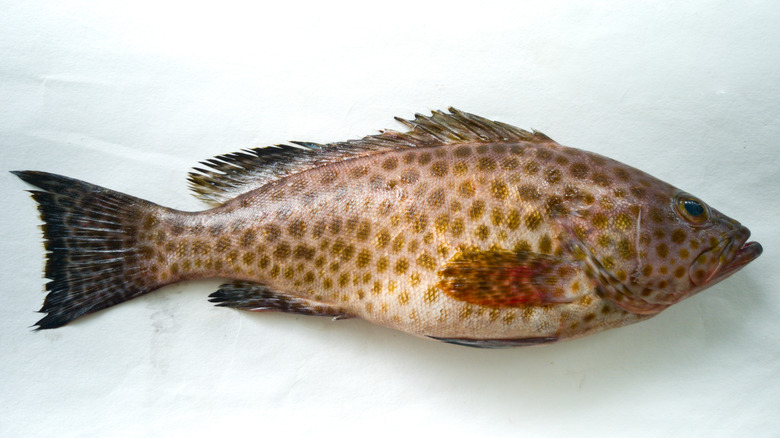You Should Never Eat Grouper. Here's Why
It's no secret that fish can be incredibly good for you healthwise. According to the Washington State Department of Health, its benefits include a low fat content, high protein, omega-3 fatty acids, and a slew of vitamins. They also note that fish has a high concentration of calcium, phosphorus, iron, zinc, magnesium, and potassium. So needless to say, it's a nutritious option worth eating. But not all fish are equal when it comes to health benefits.
Grouper is a species of fish that, when cooked, has a subtle and slightly sweet flavor, with a texture that works even when overcooked, according to Finn's Fishing Tips. Grouper was listed in Eat This, Not That!'s ranking of nutritionally beneficial fishes, with a 3-ounce serving including only 78 calories and 0.9 grams of fat, 45 milligrams of sodium, and 16.5 grams of protein. All that said, the outlet still warns against eating this variety of fish often, noting, "You'd do best to eat this fish as often as you vacation." So what's the deal with grouper?
Mercury wrecks their grade
According to One Medical, the Environmental Defense Fund has released an advisory against consuming this fish because of its high levels of mercury. In addition to this, as they don't reproduce often, groupers are fairly susceptible to overfishing. According to Very Well Fit, the excess mercury means grouper is one of a handful of fish the National Resource Defense Council recommends avoiding altogether, too, especially for pregnant or nursing women and small children. Disabled World quotes them as having somewhere between 0.3 to 0.49 parts per million, which is a notch below the highest mercury concentration that they recommend completely avoiding (ringing in at 0.5 PPM).
In addition, groupers' categorization as an overfished variety means catching and eating it is contributing to the harm already being done to the planet. According to One Green Planet, eating fish that are placed in this group wreaks havoc on the food chain, which affects not only you and the fish but the ecosystem, too. If one little fish can do that, and it's true there are plenty other fish in the sea, this could be the time to give another fish a try.

